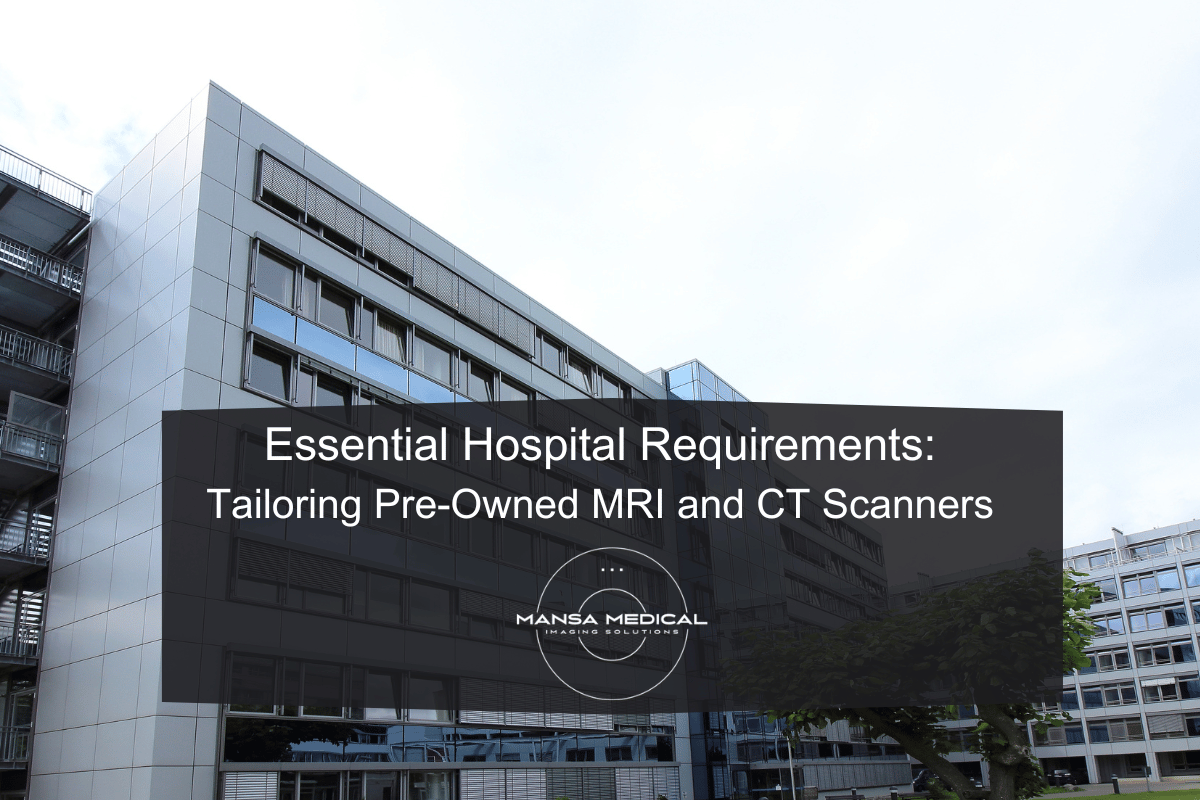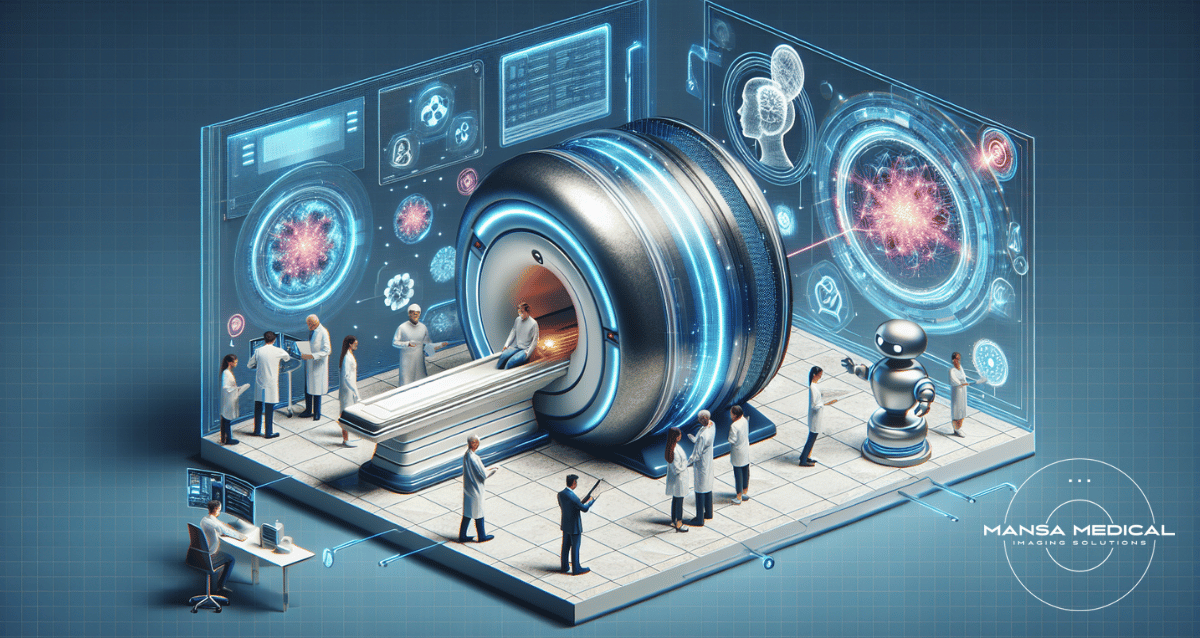Essential Hospital Requirements: Tailoring Pre-Owned MRI and CT Scanners

“Logic will get you from A to B. Imagination will take you everywhere.” — Albert Einstein.
Hospital requirements for MRI and CT scanners are critical to consider before purchasing medical imaging equipment. Space considerations, safety protocols, and infrastructure design are just the beginning. This guide walks you through what you need to know to navigate these complexities, helping you make informed decisions for your medical imaging facility.
Key Takeaways
- Proper planning for the physical space, safety, and infrastructure requirements is essential for the successful installation and operation of MRI systems in hospitals.
- When evaluating used MRI machines, consider technical features like gradient strength and magnet types, as well as the maintenance and service history, to ensure reliability and performance that meet clinical needs.
- The total cost of ownership for an MRI system, including purchase price and operational and maintenance expenses, can be managed through financing options and service contracts, with comprehensive support and training services critical for maximizing the system’s utility.
Hospital Requirements for MRI Systems

Before diving into the realm of MRI systems, comprehending the prerequisites of a hospital is vital. Thoughtful planning of where to position it is crucial for the successful setup and functioning of an MRI machine. This goes beyond simply finding adequate room for the equipment. There must be ample space allocated for related machinery, upkeep activities, and emergency protocols.
It’s imperative that a facility’s design takes into account the distinctive necessities dictated by an MRI system. This includes providing appropriate spaces designated for patients’ pre-scan preparation including waiting areas, changing rooms, as well as post-scan recovery zones.
Space and Facility Planning
Room requirements for MRI machines necessitate:
- A large room, typically no less than 400 square feet and with extra ceiling height to fit the machine
- Accessibility for all patients, especially those facing mobility challenges
- A streamlined process allowing patients to move in and out of the MRI area effectively
- Sufficient room for related equipment, staff members, as well as areas designated for preparing and recovering patients
- Structural adjustments might be needed like floor reinforcement to bear the weight of the machine or remodeling to accommodate service zones or supplementary apparatus
When planning and designing an MRI suite, it’s important that numerous factors are considered. This includes each aspect listed above.
Safety Considerations
Safety protocols are essential, considering the countless MRI scans conducted each year. To mitigate risks associated with the strong magnetic field of an MRI, such as objects being turned into projectiles and stimulation of peripheral muscles or nerves, a robust safety program should be established for MR environments. This entails compliance with ASTM International standard F2503 for all equipment used around intense magnetic fields to certify their safety.
It is vital to regularly assess safety incidents within the MR setting—including those that were narrowly avoided—to enhance overall security measures and avert potential dangers in future scenarios. At Mansa Medical, we take safety very seriously with the machines we offer our clients.
Infrastructure Requirements
MRI machines necessitate significant alterations to existing infrastructure in order to meet safety standards, which can impact the overall cost of the MRI system. This includes not only the purchase price but also expenses related to installation and logistics.
To maintain peak performance and extend the lifespan of an MRI machine once it is operational, consistent maintenance is critical. Essential practices include adherence to operating guidelines, conducting routine equipment inspections, taking steps to minimize vibration, and vigilance against overheating issues.
Evaluating Used MRI Machines

To make an informed decision regarding the acquisition of MRI equipment, particularly when examining used MRI machines in a hospital setting, it is vital to assess several critical elements. These include:
- Adherence to established performance benchmarks encompassing FDA standards, re-certification criteria, and adherence to ACR accreditation procedures.
- Technical specifics such as the variety of magnets utilized in the machine and any necessary shielding specifications.
- The logistics involved both installing the unit and providing training for its use.
By taking into account these factors, you can be confident that you’re selecting a pre-owned MRI machine that aligns well with your hospital’s needs.
It is essential to balance between meeting a hospital’s scanning requirements and managing investment costs when deciding on which MRI scanner or piece of machinery suits best. This careful consideration will guide towards acquiring suitable imaging equipment without compromising financial constraints or operational efficacy.
Gradient Strength and Slew Rate
In the intricate workings of an MRI system, both the gradient coil’s quality and the machine’s slew rate play crucial roles. The gradient coil is central to determining image resolution and overall quality. Meanwhile, the shortage rate—which measures how quickly a gradient can be activated or deactivated—bears on the scanning velocity of the system as well as on its ability to produce high-quality images.
Thus, it is clear that a well-functioning gradient system within an MRI machine profoundly influences geometric precision in MRI scans. Should there be any miscalibration within these gradients, it could result in distorted imagery which would compromise diagnostic accuracy.
Magnet Types and Field Strength
MRI machines incorporate various types of magnets, which come with different field strengths. These differences affect the image quality as well as the price point of the MRI scanner. For example, second-hand MRI scanners might exhibit a range from 1.5 to 3T in closed bore models, such as the Siemens Symphony 1.5T, equipped with superconducting magnets, whereas open bore MRIs typically utilize a permanent magnet and offer lower strengths around 0.2 – 0.4T.
As magnetic field strength increases within these systems, so too does the signal-to-noise ratio (SNR), leading to enhancements in spatial resolution that enable more precise and high-definition images to be captured by MRI technology [1].
Maintenance and Service History
The condition and future expenses associated with used MRI machines are significantly influenced by their maintenance and service records. Consistent upkeep is essential to avert breakdowns and prolong the lifespan of the equipment, while an untarnished service history indicates that the machine has been dependable.
Having MRI scanners subjected to routine, certified quality assurance examinations can improve image resolution and facilitate quicker troubleshooting. The expertise acquired by service personnel is instrumental in ensuring the efficient servicing of these machines.
Leading Manufacturers of MRI Machines

Selecting an appropriate MRI system is just as crucial as picking a reputable manufacturer. Mansa Medical provides an assortment of refurbished MRI systems that encompass open, closed, and mobile units. Yet among the leading manufacturers – GE Healthcare, Siemens Healthineers, and Philips Healthcare are distinguished for their innovative technologies and extensive selection of models when considering which machine to acquire.
GE Healthcare
GE Healthcare’s SIGNATM MRI scanners incorporate state-of-the-art technologies such as AIRTM Recon DL and AIRTM MRI. Coils to elevate diagnostic accuracy while maximizing patient comfort. Their suite of MRI systems is equipped with an extensive range of sophisticated features tailored to meet the varied clinical and diagnostic needs present in various healthcare environments.
Siemens Healthineers
Siemens Healthineers incorporates advanced MRI technology, such as the Total Imaging Matrix (TIM) system that enables imaging of the entire body without repositioning patients. Their designs also feature ‘zero boil-off’ magnets, which minimize the use of cryogens. These Siemens MRI technologies are crafted to improve imaging efficiency while providing superior image clarity and reliable outcomes.
To elevate both staff proficiency and clinical results, they have established a composite MRI training program comprising:
- Individualized learning experiences
- Distance-based education methods
- Online virtual learning sessions
- Educational chances via fellowships and collaborations with industry leaders.
Philips Healthcare
The Ingenia Ambition MR scanner with BlueSeal from Philips Healthcare represents the first and exclusive fully sealed magnet MRI system in the industry, operating at 1.5T.
This range of products is designed to elevate patient care by focusing on advancing diagnostic certainty, speed, and comfort for patients.
Cost Analysis of Used MRI Machines

When choosing an MRI machine, the price is a critical factor to consider. The cost of MRI systems spans a broad range, from 30,000 to 500,000 USD, with the average MRI machine cost hovering around 160,704 USD. Siemens MRI scanners offer significant value by balancing initial purchase costs—which are on par with those of Philips—and maintenance expenses that are more in line with GE’s offerings for their machines.
Purchase Price vs. Total Cost of Ownership
The cost of acquiring an MRI machine extends beyond its initial purchase price, encompassing a broader spectrum of expenses related to ownership. These include:
- Running costs
- Upkeep
- Workforce expenditure
Opportunities exist to mitigate these costs through financial arrangements such as buying or leasing options.
By adopting this inclusive expense model, healthcare facilities can pinpoint and tactically control the indirect costs tied to warranties, service agreements, and additional operating outlays that come with an MRI machine.
Financing Options
Medical practices have the option to finance or lease MRI equipment over a period ranging from 24 months up to 72 months, with the possibility of covering the entire value of the MRI machine, frequently without requiring an initial down payment. The financing options for MRI machines offer competitive fixed rates starting at as low as 3.25%. Payments directed towards this financing might be accompanied by tax advantages. The process to secure approval for financing an MRI can typically be completed in just a few hours, and funds are often accessible within several business days—streamlining and expediting acquisition.
Service agreements and warranties may also be included when leasing or financing an MRI machine. This ensures its dependability while also keeping maintenance expenses predictable and under control.
Warranty and Service Contracts
The total ownership cost of an MRI system is considerably affected by the continual service expenses. Specifically, MRI scanners from Philips often necessitate the use of liquid helium, which contributes to increased sustained service costs.
It’s important to have service agreements for Philips MRI systems in place to address cryogen depletion since these devices typically utilize cryogen.
Support and Training Services

After the installation of an MRI system, attention turns towards providing support and educational services. Organizations such as PrizMed Imaging present a variety of options, which encompass:
- Comprehensive turnkey solutions
- Customized services designed to meet individual customer requirements
- Choices for enhancements that augment the functionality of MRI systems
- Assistance and instruction aimed at enabling users to optimize the performance of their system.
Installation and Setup
The setup and implementation of MRI systems is an intricate procedure that demands expertise from experienced engineers. Firms such as BC Technical specialize in the relocation of these systems, making sure the process is both secure and effective by managing elements like rigging, transportation, and even storage if necessary. They also put forward tailored service agreements that enable customers to define particular details such as response timescales, hours for service provision, and commitments on operational uptime, along with a stipulated count of routine maintenance checks to accommodate their specific requirements within budget.
They offer enhancements for existing MRI system capabilities through OEM upgrade kits. Beyond this scope are provisions made available for refurbished MRI systems and opportunities to lease mobile MRIs over various periods—guaranteeing deployment and configuration at customer sites complemented by around-the-clock comprehensive support every day of the year.
Training Programs
Operating an MRI machine requires essential training. Suppliers usually offer extensive education programs that encompass the following:
- Services for the installation and configuration of machines
- Learning options that are remote or virtual in nature
- Online courses accessible through electronic platforms
- Interactive web-based seminars
- Educational video content
Such educational resources improve knowledge regarding MRI usage and assist operators in becoming adept at handling these machines.
Adaptive learning is delivered through tailored education, which includes workshops facilitated with MR SmartSimulators. There are specially designed classroom lessons and practical sessions aimed at enhancing the skills of MR technologists in utilizing MRI software effectively.
Ongoing Support
The sustained performance and durability of pre-owned MRI systems hinge on the consistent provision of support and maintenance services. Firms such as BC Technical deliver adaptable service plans that can be modified to encompass particular service requirements, along with an extensive stockpile exceeding 65,000 imaging parts—encompassing items potentially no longer procurable from original producers.
Hospitals in need of transferring their MRI systems have access to all-inclusive moving services. These cover the entire process from deinstallation to reinstallation, coupled with onsite installation guidance provided by skilled engineers.
Securing Tranquility: Mansa Medical’s Commitment to Transformative Healthcare Technology
Mansa Medical is dedicated to supplying top-tier diagnostic imaging equipment, such as MRI scanners, CT machines, and PET / CT machines. Our passion for the transformative power of contemporary medical practices and the advancements in healthcare technology fuels our commitment. We are motivated by the impact that their products can have on individuals’ lives.
When concluding any task at hand, we pose a crucial question: “Would I feel comfortable if my father used this machine? Or what about my brother? My spouse or child? Should there be even a slight doubt in response to these questions, we know more work needs to be done—we never settle until assurance is absolute. Choosing Mansa Medical means you’re not just purchasing an apparatus. You’re securing tranquility for yourself and your loved ones with our medical diagnostic equipment company. Start with our simple, proven process, and stop worrying about how much ultrasound machines cost.
Full Summary
We’ve taken an in-depth look at the complexities involved in choosing, implementing, and upkeeping a pre-owned regular MRI machine or mobile MRI machine for hospital use. We assessed what hospitals need to have in place, scrutinized the technical specifications of these machines, weighed up investment considerations, and examined what leading manufacturers offer. We emphasized how crucial support and training services are while spotlighting companies such as Mansa Medical’s dedication to excellence. When you’re navigating through the process of selecting an MRI machine for your facility, remember that meticulous preparation combined with knowledgeable decision-making rooted in patient well-being will lead you toward making a selection that not only improves patient care but also contributes positively to global health standards.
Frequently Asked Questions
Does your whole body go into a CT scan machine?
Indeed, while you recline on the table, the machine conducts a CT scan of your whole body. This process enables it to capture transverse X-ray photographs of your internal organs and tissues [2].
What are the key factors to consider when planning for an MRI system in a hospital?
In preparing to install an MRI system within a hospital, it is vital to account for various factors including the availability of adequate space, adherence to safety protocols, and necessary infrastructure requirements. These elements are imperative for ensuring that the integration and functioning of the MRI system within the healthcare setting is seamless.
How important is the service history when purchasing a used MRI machine?
When acquiring a pre-owned MRI machine, the record of its service history is vital because it suggests how reliable the machine will be in the future and what potential expenses may arise, revealing if proper maintenance has been consistently upheld.
What are the differences between the MRI machines offered by GE Healthcare, Siemens Healthineers, and Philips Healthcare?
To recapitulate, GE Healthcare underlines the use of sophisticated technologies that enhance both patient ease and the accuracy of diagnoses. Siemens Healthineers focuses on state-of-the-art imaging for the entire body alongside efficient designs for magnets, whereas Philips Healthcare concentrates on delivering rapid results with a comfortable experience and bolstering confidence in diagnostics [3].
Besides the purchase price, what other costs need to be considered when buying an MRI machine?
When acquiring an MRI machine, it is crucial to take into account not only the initial cost of purchase, but also other expenses such as operational costs, maintenance requirements, staffing necessities, financing alternatives, warranties offered and service contracts available. These elements collectively influence the overall cost associated with owning an MRI machine.
